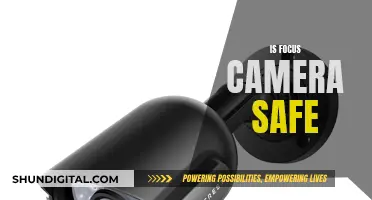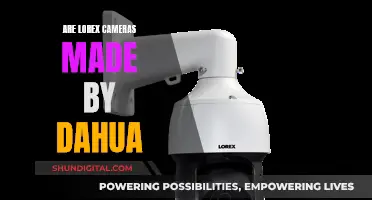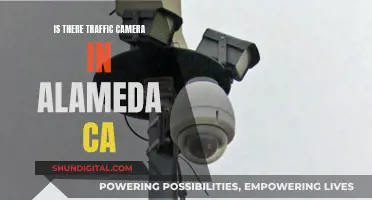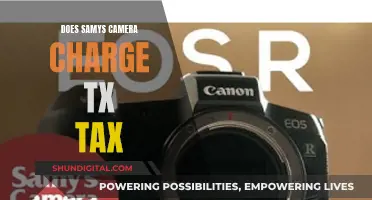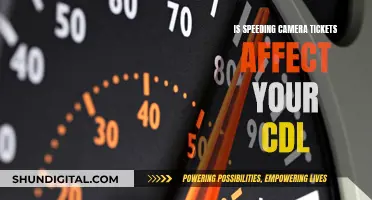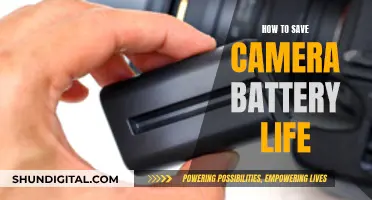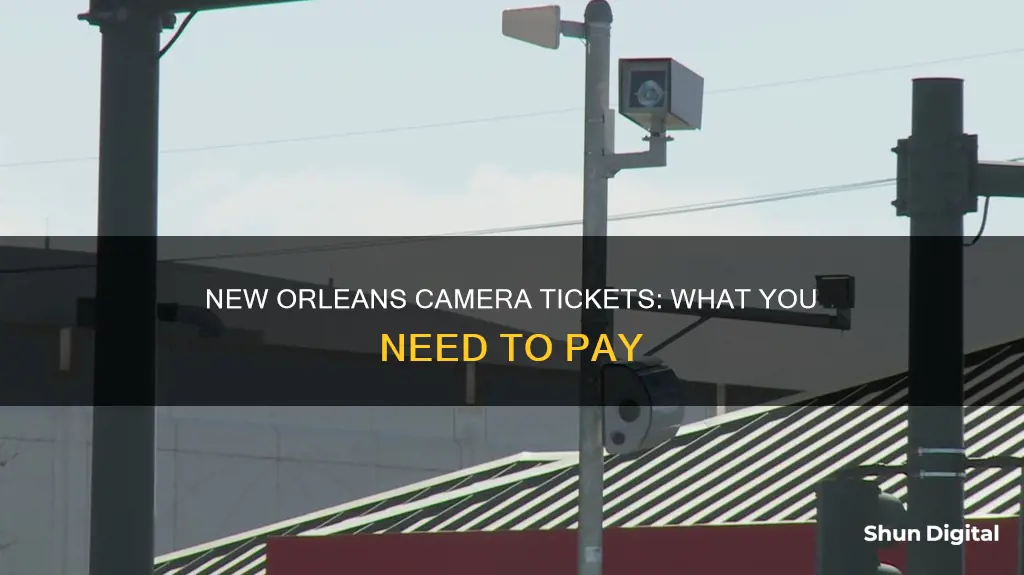
In New Orleans, camera tickets are traffic violations issued to vehicles, not drivers, and are sent to the registered owner of the vehicle. These tickets are issued when a digital camera and violation detection system detect a vehicle violating traffic laws. While these tickets are essentially a money grab by the city, they can result in fines, late payment penalties, and even the booting or towing of your vehicle if left unpaid. While some people choose to ignore these tickets, it is important to note that they can cause problems and stack up over time. Additionally, while camera tickets are harder to fight than traditional traffic tickets, there are still ways to contest them.
| Characteristics | Values |
|---|---|
| What are camera tickets? | Tickets received in the mail after a traffic camera captures a vehicle violating a traffic law |
| Are camera tickets reported to the DMV or insurance company? | No |
| What happens if you don't pay camera tickets? | Your car may be booted or towed |
| What happens if you don't pay a police officer's ticket? | You may face a warrant for your arrest or a suspended license |
| Are camera tickets hard to fight? | Yes, because they are handled by a city employee acting as a hearing officer and it is easier for them to look at the photo or video evidence and find you guilty |
| What do you need to receive a camera ticket? | A photo of your vehicle committing the traffic violation |
| What happens if someone else gets a camera ticket in your car? | You are liable as the owner of the vehicle |
| What happens if you don't pay camera tickets and park on the street? | You will eventually get booted |
| What is the fine for a red-light camera violation in New Orleans? | $105, plus a $30 administrative fee, totaling $135 |
| What are the fines for speed violations? | $45-$205, plus a $30 administrative fee, totaling $75-$235 |
| What happens if you don't pay the fine within 30 days? | A $75 penalty will be added to the fine amount and the matter will be submitted to a collection agency |
What You'll Learn
- Camera tickets are civil violations against the vehicle, not the driver
- The City of New Orleans uses cameras to enforce traffic laws and improve road safety
- Camera tickets are harder to fight than tickets from police officers
- Failing to pay camera tickets can result in your car being booted or towed
- Some people choose to ignore camera tickets without facing consequences, but this is risky

Camera tickets are civil violations against the vehicle, not the driver
In New Orleans, camera tickets are civil violations against the vehicle, not the driver. This means that if you lend your car to someone and they get a camera ticket, you are the one who will face the consequences if the ticket goes unpaid. The City of New Orleans will not report the violation to the DMV or your insurance company, but the tickets can stack up and become costly.
Camera tickets are issued when a traffic camera captures a vehicle violating a traffic law. The ticket is then mailed to the registered owner of the vehicle, along with photo evidence of the violation. While these tickets are not criminal violations, they can result in fines and other penalties if left unpaid.
In the case of red-light camera tickets, the driver of the vehicle is responsible, not the owner. However, the ticket is still mailed to the address of the vehicle owner. If the photo evidence does not show the owner of the vehicle as the driver, the ticket can be contested with the help of an attorney.
While it is possible to ignore camera tickets or change your license plate to avoid paying, this can lead to further legal issues and is generally not advised. It is important to be aware of the laws and regulations regarding camera tickets in your specific location, as they may vary.
Overall, while camera tickets in New Orleans are civil violations against the vehicle and not the driver, it is important to take them seriously and consider seeking legal advice if you are unsure of how to proceed.
Starlink's Camera: Tesla's Battery Power Source?
You may want to see also

The City of New Orleans uses cameras to enforce traffic laws and improve road safety
The Insurance Institute for Highway Safety reports that red light running is a leading cause of urban crashes, often resulting in injury and death. The camera system aims to deter red light running and reduce speeding, ultimately improving public safety. When a vehicle runs a red light or exceeds the speed limit, the cameras capture high-resolution photos, which are then mailed with a citation to the registered owner of the vehicle.
The fine for a red-light camera violation in New Orleans is $105, plus an administrative fee of $30, totalling $135. Fines for speed violations are tiered based on the number of miles per hour over the speed limit, ranging from $75 to $235. Failure to pay the fine within 30 days will result in the matter being submitted to a collection agency, and a $75 penalty will be added.
While some may view these camera tickets as a "money grab" by the city, they are civil violations against the vehicle, not the driver. They are separate from traditional traffic tickets issued by police officers, which can result in more severe consequences such as a warrant for arrest or license suspension if unpaid. It is important to note that camera tickets are harder to dispute due to the conclusive evidence provided by the photos, and the different court rules applied by city hearing officers.
Overall, the City of New Orleans' use of cameras for traffic enforcement is intended to enhance road safety by reducing red-light running and speeding, ultimately preventing crashes and saving lives.
Hive Camera: Battery Operated or Not?
You may want to see also

Camera tickets are harder to fight than tickets from police officers
In New Orleans, you are generally expected to pay camera-issued traffic tickets. These tickets are civil violations against the vehicle and do not get reported to the DMV or your insurance company. While they are considered a money-grab by the City of New Orleans, they can result in your car being booted or towed if left unpaid.
Camera tickets are harder to fight than tickets issued by police officers. This is because they are handled by a city employee, not a judge, and the court rules are different. The employee simply reviews the video or picture from the ticket and determines guilt. To receive a camera ticket, there must be a photo of your vehicle committing the traffic violation, and this photo is considered conclusive evidence of the violation.
While there are ways to fight a camera ticket, it can become costly. For example, you may need to hire a lawyer to help you fight the ticket in court. However, it is important to note that even if you win your case, the court will still hear your concern but will not dismiss the camera ticket fully. Instead, they may mitigate the fine.
On the other hand, if you get a ticket from a police officer and fail to appear or pay, it can result in more severe consequences, such as a warrant for your arrest and a suspended license. Therefore, it is generally recommended to hire an attorney to handle this type of ticket.
Extending Black Magic Camera Battery Life: Top Tips
You may want to see also

Failing to pay camera tickets can result in your car being booted or towed
In New Orleans, a camera ticket is a ticket you receive in the mail after a traffic camera captures your vehicle violating a traffic law. It is a civil violation against the vehicle and does not get reported to the DMV or your insurance company. While these tickets are essentially a money grab by the City of New Orleans, they can result in your car being booted or towed if left unpaid.
A boot is a large, heavy metal device that clamps onto one of the wheels of a vehicle, preventing it from driving away. In most cases, a vehicle owner will receive several warnings in the mail before their vehicle is marked as eligible for booting. Booting is typically used as a last resort for repeat offenders who have multiple unpaid parking citations.
In New Orleans, failing to pay camera tickets can result in your car being booted or towed. While this is not as severe as the consequences of failing to pay a ticket issued by a police officer, it can still cause significant inconvenience and expense.
If your car is booted, you will need to pay your outstanding tickets and a boot fee to have the boot removed. In some cases, you may be able to set up a payment plan. If you do not take action within a certain timeframe, your vehicle may be towed and impounded, and could eventually be auctioned off if you do not retrieve it.
To avoid the hassle and expense of having your car booted or towed, it is generally advisable to pay camera tickets promptly. While it may be tempting to ignore these tickets, particularly if you feel they are unfair, the consequences can be costly and time-consuming.
Drive Mode Button: Understanding Camera's Power Feature
You may want to see also

Some people choose to ignore camera tickets without facing consequences, but this is risky
In New Orleans, a camera ticket is a ticket you receive in the mail after a traffic camera captures your vehicle violating a traffic law. It is a civil violation against the vehicle and does not get reported to the DMV or insurance company. These tickets are seen by some as a money grab by the City of New Orleans.
While some people may choose to ignore camera tickets without facing immediate consequences, this can be risky. Failing to pay a camera ticket can result in your car being booted or towed if parked on public property in Orleans Parish. Although this is not as severe as the consequences of an unpaid traffic ticket issued by a police officer, which could result in a warrant for your arrest and a suspended license, it is still a costly and inconvenient outcome.
The delay in consequences for unpaid camera tickets may give the impression that they can be ignored. Some individuals in New Orleans have shared their experiences of accumulating multiple camera tickets over several years without facing any repercussions. However, it is important to note that the consequences may eventually catch up, and the outstanding fines can add up to a significant amount.
Additionally, the process of fighting a camera ticket can be challenging and costly. The hearing is handled by a city employee, not a judge, and the rules of evidence may differ. The photo or video evidence of the violation is often considered conclusive, making it difficult to dispute the ticket. While there are strategies to reduce or avoid paying camera tickets, such as changing license plates or negotiating fees, these approaches may not always be successful or ethical.
In conclusion, while it may be tempting to ignore camera tickets due to the delayed consequences, it is a risky choice. The potential for vehicle booting or towing, along with the difficulty of disputing tickets, makes it advisable to stay compliant and pay the fines to avoid further complications.
Kodak AZ652 Camera Battery: What's Inside?
You may want to see also
Frequently asked questions
Yes, camera tickets are still in place and will cause problems if not paid.
The worst thing that can happen is that your car will be booted or towed.
You can pay online at www.ViolationInfo.com, by phone, by mail, or in person at City Hall or Clairborne Auto Pound.
You may be hounded by a collection agency and threatened by collections.
Camera tickets are civil violations against the vehicle, not the driver, and are issued when a traffic camera captures your vehicle violating a traffic law.


